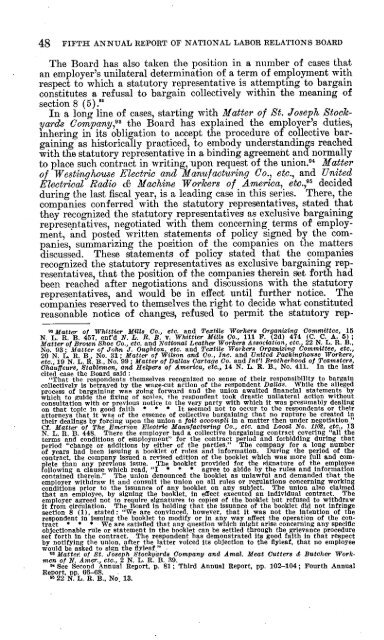NATIONAL LAB RELATIONS BOARD - National Labor Relations ...
NATIONAL LAB RELATIONS BOARD - National Labor Relations ...
NATIONAL LAB RELATIONS BOARD - National Labor Relations ...
Create successful ePaper yourself
Turn your PDF publications into a flip-book with our unique Google optimized e-Paper software.
48 FIFTH ANNUAL REPORT OF <strong>NATIONAL</strong> <strong>LAB</strong>OR <strong>RELATIONS</strong> <strong>BOARD</strong>The Board has also taken the position in a number of cases thatan employer's unilateral determination of a term of employment withrespect to which a statutory representative is attempting to bargainconstitutes a refusal to bargain collectively within the meaning ofsection 8 (5)."In a long line of cases, starting with Matter of St. Joseph StockyardsCompany," the Board has explained the employer's duties,inhering in its obligation to accept the procedure of collective bargainingas historically practiced? to embody understandings reachedwith the statutory representative in a binding agreement and normallyto place such contract in writing, upon request of the union. 94 Matterof Westinghouse Electric and Manufacturing Co., etc., and UnitedElectrical Radio & Machine Workers of America, ete., 95 decidedduring the last fiscal year, is a leading case in this series. There, thecompanies conferred with the statutory representatives, stated thatthey recognized the statutory representatives as exclusive bargainingrepresentatives, negotiated with them concerning terms of employment,and posted written statements of policy signed by the companies,summarizing the position of the companies on the mattersdiscussed. These statements of policy stated that the companiesrecognized the statutory representatives as exclusive bargaining representatives,that the position of the companies therein set forth hadbeen reached after negotiations and discussions with the statutoryrepresentatives, and would be in effect until further notice. Thecompanies reserved to themselves the right to decide what constitutedreasonable notice of changes, refused to permit the statutory rep-02 Matter of Whittier Mills Co., etc. and Textile Workers Organizing Committee, 15N. L. R. B. 457, enf'd N. L. R. B. v. Whittier Mills Co., 111 F. (2d) 474 (C. C. A. 5;Matter of Brown Shoe Co., etc. and <strong>National</strong> Leather Workers Association, etc., 22 N. L. R. B.,No. 93 ; Matter of John J. Oughton, etc. and Textile Workers Organizing Committee, etc.,20 N. L. R. B No. 31; Matter of 'Wilson and Co., Inc. and United Packinghouse Workers,etc., 19 N. L. If. B., No. 99 • Matter of Dallas Cartage Co. and Int'l Brotherhood of Teamsters,Chauffeurs, Stablemen, and Helpers of America, etc., 14 N. L. R. B., No. 411. In the lastcited case the Board said :"That the respondents themselves recognized no sense of their responsibility to bargaincollectively is betrayed by the wage-cut action of the respondent Dallas. While the allegedprocess of bargaining was going forward and the union awaited financial statements bywhich to guide the fixing of scales, the respondent took drastic unilateral action withoutconsultation with or previous notice to the very party with which it was presumably dealingon that topic in good faith • • • It seemed not to occur to the respondents or theirattorneys that it was of the essence of collective bargaining that no rupture be created intheir dealings by forcing upon the union n fait accompli in a matter then under negotiation"Cf. Matter or The Emerson Electric Manufacturing Co., etc. and Local No. 1102, etc., 13N. L. R. B. 448. There the employer had a collective bargaining contract covering "all theterms and conditions of employment" for the contract period and forbidding during thatperiod "change or additions by either of the parties." The company for a long numberof years had been issuing a booklet of rules and information. During the period of thecontract, the company issued a revised edition of the booklet which was more full and completethan any previous issue. The booklet provided for the signature of the employeefollowing a clause which read, "I • • • agree to abide by the rules and informationcontained therein." The union denounced the booklet as unlawful and demanded that theemployer withdraw it and consult the union on all rules or regulations concerning workingconditions prior to the issuance of any booklet on any subject. The union also claimedthat an employee, by signing the booklet, in effect executed an individual contract. Theemployer agreed not to require signatures to copies of the booklet but refused to withdrawit from circulation. The Board in holding that the issuance of the booklet did not infringesection 8 (1), stated : "We are convinced, however, that it was not the Intention of therespondent in issuing the booklet to modify or in any way affect the operation of the contract* * • We are satisfied that any question which might arise concerning any specificobjectionable rule or statement in the booklet can be settled through the grievance procedureset forth in the contract. The respondent has demonstrated its good faith in that respectby notifying the union, after the latter voiced its objection to the flyleaf, that no employeewould be asked to sign the flyleaf"99 Matte?! of St. Joseph Stockyards Company and Antal. Meat Cutters d Butcher Workmenof N. Amer., etc., 2 N. L. R. B. 39.91 See Second Annual Report, p. 81; Third Annual Report, pp. 102-104; Fourth AnnualReport., pp. 60-68.95 22 N. L. R. B., No 13.
















